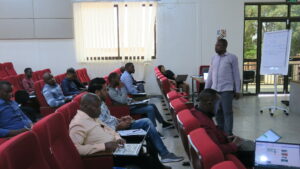3 August 2023, Kigali Rwanda Standards Board (RSB) in collaboration with Global Green Growth Institute (GGGI) conducted training for trainers (business owners engaged in Municipal solid waste management), aiming at raising their knowledge on effective health and safety management systems in operations of the waste management activities across the value chain. This training is part of series of capacity building initiatives for Outcome C of the project for Secondary Cities to improve on policy and regulatory environment and enhanced capacity through skills development and knowledge exchange. The Ministry of Environment of the Government of Rwanda initiated a Memorandum of Understanding (MoU) with the Ministry of the Environment, Climate and Sustainable Development of the Government of the Grand Duchy of Luxembourg to strengthen cooperation and technology transfer between the two countries titled project Waste to Resources: Improving Municipal Solid Waste (MSW) and Hazardous Waste Management in Rwanda.
During the Occupational Health and Safety (OHS) awareness training health and safety measures and best practices on collection, transportation, treatment (recycling) and disposal were discussed. Other stakeholders including Ministry of Public Service and Labor (MIFOTRA) and Rwanda Utilities and Regulatory Authority (RURA) provided training on the need to apply OHS in workplace including overview of the Workplace Occupational Health and Safety guidelines and policies ; training on Occupational Health and Safety Licenses and training on Occupational Health and Safety standards by Rwanda Standards Board (RSB).
Improper solid waste management poses health and safety risks to all involved in collection, sorting, treatment and disposal, The government of Rwanda has put in place different Legislations such as Ministerial order No. 01 of 17/05/2012 determining the modalities of establishing and functioning of Occupational Safety and Health committees and Ministerial order No. 02 of 17/05/2012 determining conditions for Occupational Safety and Health in workplaces. Basing on ISO 45001:2018.
Cities are increasingly faced with mounting challenges that result from business-as-usual practices in waste management. GGGI has increasingly become acknowledged as a trusted knowledge sharing and implementation partner for circular economy approaches to waste management. As a result, GGGI has established projects in Asia, Latin America, and Africa that deliver benefits to municipalities by using a circular economy approach.
The aim of Occupational Health and Safety Management System (OHSMS) is to help an organization’s continually improve on its Occupational Health and Safety (OHS) performance through the effective management of occupational risks and hazards at workplace. Occupational health and accident risks exposure relates to the content of the materials handled, emissions from those materials, and the equipment being used, even though workers in waste sector are exposed towards various high-risk factors such as mechanical element as well as biological and chemical risks Health and safety measures are rarely enforced. Waste pickers work informally at open dumps, typically living adjacent to the dumpsite in poor housing conditions, with minimal basic infrastructure for clean water and sanitation; Wastes sorting and recycling activities are typically conducted manually in micro and small-scale enterprises, with minimal washing and baling equipment and with no dust control or worker protection.

Workplace health and safety does not occur without constraints, and this is further enhanced by the lack of health and safety hazard control system, lack of technical capacities, as well as lack of awareness in occupation health and safety practices.
The objective of the training was to establish and maintain health and safety practices through:
1. Raising awareness of standardized Health and Safety practices in waste management
2. Increasing knowledge on the potential hazards and risks associated with waste management practices and prevention techniques.
3. Defining responsibilities of company owners engaged in Municipal Solid Waste Management vis a vis the OHS policy and regulations.
The workshop was specifically developed to help the participants understand Health and safety standards and policies in waste management ; understanding their roles and responsibilities as Business owners engaged with municipal solid waste management on health and safety practices and to better understanding on how to minimize the negative effects on workers that emerge from a lack of safety and health procedures.